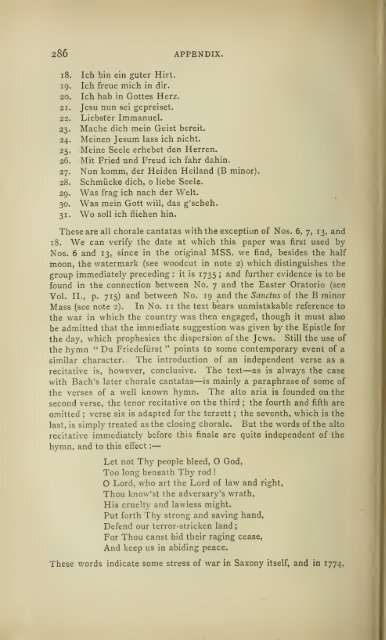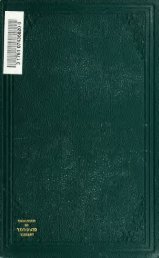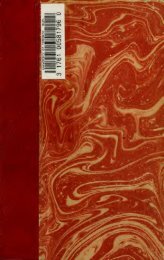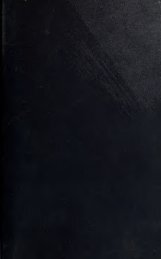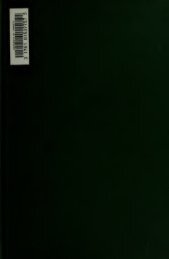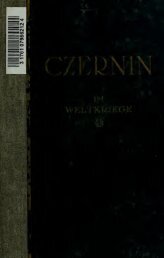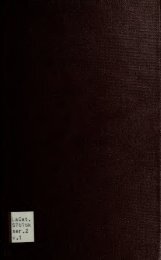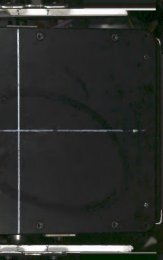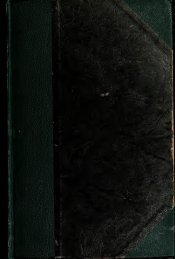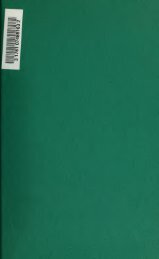- Page 1 and 2:
o.tL-(DCMCNJu.==\r> mUJ">=z=3^r.inr
- Page 4:
Digitized by tine Internet Arciiive
- Page 8 and 9:
MLV.3
- Page 11:
BOOK VI.THE FINAL PERIOD OF BACH'S
- Page 14 and 15:
4 JOHANN SEBASTIAN (pACH.of long co
- Page 16 and 17:
OJOHANN SEBASTIAN BACH.second prefe
- Page 18:
Vor—öJOHANN SEBASTIAN BACH.had r
- Page 21 and 22:
—DISPUTE WITH ERNESTI.IIin his ho
- Page 23 and 24:
;RESULTS OF THE QUARREL.I3only take
- Page 25 and 26:
musicum,oderGriindl.Gedrucktdenenwo
- Page 27 and 28:
—;THE ORIGIN OF THE CONCERT. 17ch
- Page 29 and 30:
THE ORIGIN OF THE CONCERT.I9the Br
- Page 31 and 32:
BACHS INCREASING CELEBRITY 21that h
- Page 33 and 34:
^:mizler's musical society. 23publi
- Page 35 and 36:
—bach'-s connection with mizler.
- Page 37 and 38:
THE SHORTENED MASS. 27certainty. Du
- Page 39 and 40:
EARLY ITALIAN MASSES. 2gback than L
- Page 41 and 42:
ach's masses in g major and minor.
- Page 43 and 44:
"bach's mass in a. 33which precedes
- Page 45 and 46:
—bach's mass in f.35tven of the L
- Page 47 and 48:
BACH S SHORT MASSES. 37by the bass,
- Page 49 and 50:
—;THE B MINOR MASSKYRIE AND GLORI
- Page 51 and 52:
—;THE B MINOR MASSSANCTUS.4Imenti
- Page 53 and 54:
B MINOR MASS—ITS PROTESTANT FEELI
- Page 55 and 56:
—THE PROTESTANT MASS. 45with the
- Page 57 and 58:
—THE STRUCTURE OF THE B MINOR MAS
- Page 59 and 60:
——THE B MINOR MASS—ITS SYMBOL
- Page 61 and 62:
THE B MINOR MASS— ITS SYMBOLISM.
- Page 63 and 64:
THE B MINOR MASS—GENERAL CHARACTE
- Page 65 and 66:
——THE B MINOR MASSGLORIA. 55set
- Page 67 and 68:
—THE B MINOR MASSCREDO.57parts ab
- Page 69 and 70:
—THE B MINOR MASS—FINAL SECTION
- Page 71 and 72:
—THE B MINOR MASS—FINAL SECTION
- Page 73 and 74:
—Vnere stillTHE B MINOR MASS AND
- Page 75 and 76:
secondly,THE CANTATA " DU FRIEDEFÜ
- Page 77 and 78:
"war GOTT NICHT MIT UNS." 67chorale
- Page 79 and 80:
— ——TWO WHITSUNTIDE CANTATAS.
- Page 81 and 82:
CANTATAS FOR 1735. 71The similar ar
- Page 83 and 84:
—CANTATAS FOR 1735. 73exhibits a
- Page 85 and 86:
—;"bleib bei uns. 75alle Gott," s
- Page 87 and 88:
—CANTATAS, I737—174I. 77from th
- Page 89 and 90:
ADAPTATIONS OF INSTRUMENTAL WORKS.y
- Page 91 and 92:
" ES 1ST EIN TROTZIG." 8lperverse a
- Page 93 and 94:
CANTATAS FOR SOLO VOICES. 83church
- Page 95 and 96:
CANTATAS FOR SOLO VOICES. 85of infi
- Page 97 and 98:
—CHORALE CANTATAS. 8?but its char
- Page 99 and 100:
—CHORALE CANTATAS. 89nature of th
- Page 101 and 102:
CHORALE CANTATAS.QIas to their date
- Page 103 and 104:
6CHORALE CANTATAS—USE OF RECITATI
- Page 105 and 106:
CHORALE CANTATAS—MADRIGAL PARAPHR
- Page 107 and 108:
—CHORALE CANTATAS—THE USE OF TH
- Page 109 and 110:
CHORALE CANTATAS—THE USE OF THE M
- Page 111 and 112:
CHORALE CANTATAS—TRANSITION FORMS
- Page 113:
;CHORALE CANTATAS—TRANSITION FORM
- Page 116 and 117:
—I06JOHANN SEBASTIAN BACH.middle
- Page 118 and 119:
Io8JOHANN SEBASTIAN BACH.possible s
- Page 120 and 121:
efindlichLiederCopiesGesang-Buch,Vo
- Page 122 and 123:
—112 JOHANN SEBASTIAN BACH.melodi
- Page 124 and 125:
114 JOHANN SEBASTIAN BACH." Meines
- Page 126 and 127:
Il6JOHANN SEBASTIAN BACH.but he had
- Page 128 and 129:
il8JOHANN SEBASTIAN BACH.be pliable
- Page 130 and 131:
120 JOHANN SEBASTIAN BACH.assured t
- Page 132 and 133:
122 JOHANN SEBASTIAN BACH.the redup
- Page 134 and 135:
—'124 JOHANN SEBASTIAN BACH.lessn
- Page 136 and 137:
120 JOHANN SEBASTIAN BACH.the violi
- Page 138 and 139:
128 JOHANN SEBASTIAN BACH.it is pre
- Page 140 and 141:
130 JOHANN SEBASTIAN BACH.third int
- Page 142 and 143:
;132 JOHANN SEBASTIAN BACH.inaliena
- Page 144 and 145:
JOHANN134 .SEBASTIAN BACH.Bach's co
- Page 146 and 147:
136 JOHANN SEBASTIAN BACH.Society.
- Page 148 and 149:
;138 JOHANN SEBASTIAN BACH.concerto
- Page 150 and 151:
stamp.^^^;140 'JOHANN SEBASTIAN BAC
- Page 152 and 153:
fitted142 JOHANN SEBASTIAN BACH.and
- Page 154 and 155:
VAfor144 JOHANN SEBASTIAN BACH.from
- Page 156 and 157:
146 JOHANN SEBASTIAN BACH.is not th
- Page 158 and 159:
——;148 JOHANN SEBASTIAN BACH.ex
- Page 160 and 161:
150 JOHANN SEBASTIAN BACH.into the
- Page 162 and 163:
152 JOHANN SEBASTIAN BACH.direction
- Page 164 and 165:
154 JOHANN SEBASTIAN BACH.deck out
- Page 166 and 167:
156 JOHANN SEBASTIAN BACH.At that t
- Page 168 and 169:
158 JOHANN SEBASTIAN BACH.of Bach's
- Page 170 and 171:
l6oJOHANN SEBASTIAN BACH.The gigue
- Page 172 and 173:
102 JOHANN SEBASTIAN BACH.intensifi
- Page 174 and 175:
;164 JOHANN SEBASTIAN BACH.differen
- Page 176 and 177:
l66JOHANN SEBASTIAN BACH.easiest to
- Page 178 and 179:
l68JOHANN SEBASTIAN BACH.clavier pi
- Page 180 and 181:
170 JOHANN SEBASTIAN BACH.Setting a
- Page 182 and 183:
172 JOHANN SEBASTIAN BACH.requireme
- Page 184 and 185:
—174 JOHANN SEBASTIAN BACH.lifted
- Page 186 and 187:
——176 JOHANN SEBASTIAN BACH.The
- Page 188 and 189:
—;178 JOHANN SEBASTIAN BACH.villa
- Page 190 and 191:
-f—•-1r— — ——to^-dtj—
- Page 192 and 193:
JOHANNl82,SEBASTIAN BACH.The bold i
- Page 194 and 195:
184 JOHANN SEBASTIAN BACH.The C maj
- Page 196 and 197:
;l86JOHANN SEBASTIAN BACH.Even in t
- Page 198 and 199:
;lööJOHANN SEBASTIAN BACH.resigne
- Page 200 and 201:
igOJOHAXX SEBASTIAN BACH.there is a
- Page 202 and 203:
1 92 JOHANN SEBASTIAN BACH.work, wh
- Page 204 and 205:
194 JOHANN SEBASTIAN BACH.which he
- Page 206 and 207:
igöJOHANN SEBASTIAN BACH.The Sonat
- Page 208 and 209:
igSJOHANN SEBASTIAN BACH.three subj
- Page 210 and 211:
'200 JOHANN SEBASTIAN BACH.in the c
- Page 212 and 213:
202 JOHANN SEBASTIAN BACH.four.^''^
- Page 214 and 215:
204 JOHANN SEBASTIAN BACH.tion, but
- Page 216 and 217:
206 JOHANN SEBASTIAN BACH.must have
- Page 218 and 219:
208 JOHANN SEBASTIAN BACH.and at th
- Page 220 and 221:
210 JOHANN SEBASTIAN BACH.structure
- Page 222 and 223:
212 JOHANN SEBASTIAN BACH.would giv
- Page 224 and 225:
214 JOHANN SEBASTIAN BACH.arrangeme
- Page 226 and 227:
2l6JOHANN SEBASTIAN BACH.unser Herr
- Page 228 and 229:
2l8 JOHANN SEBASTIAN BACH.Still he
- Page 230 and 231:
220 JOHANN SEBASTIAN BACH.—and wa
- Page 232 and 233:
222 JOHANN SEBASTIAN BACH.church mu
- Page 234 and 235:
:the224 JOHANN SEBASTIAN BACH.to We
- Page 236 and 237:
226 JOHANN SEBASTIAN BACH.In 1731 t
- Page 238 and 239:
228 JOHANN SEBASTIAN BACH.meister t
- Page 240 and 241:
230 JOHANN SEBASTIAN BACH."Was mir
- Page 242 and 243:
232 JOHANN SEBASTIAN BACH.Silberman
- Page 244 and 245:
234 JOHANN SEBASTIAN BACH.it has no
- Page 246 and 247: 236 JOHANN SEBASTIAN BACH.public wi
- Page 248 and 249: 238 JOHANN SEBASTIAN BACH.It is a c
- Page 250 and 251: 240 JOHANN SEBASTIAN BACH.came also
- Page 252 and 253: 242 JOHANN SEBASTIAN BACH.who has d
- Page 254 and 255: 244 JOHANN SEBASTIAN BACH.Capellmei
- Page 256 and 257: 246 JOHANN SEBASTIAN BACH.Johann Th
- Page 258 and 259: 248 JOHANN SEBASTIAN BACH.in June,
- Page 260 and 261: 250 JOHANN SEBASTIAN BACH.members o
- Page 262 and 263: 252 JOHANN SEBASTIAN BACH.cousin ha
- Page 264 and 265: 254 JOHANN SEBASTIAN BACH.oratory a
- Page 266 and 267: 256 JOHANN SEBASTIAN BACH.matters,
- Page 268 and 269: 258 JOHANN SEBASTIAN BACH.before ve
- Page 270 and 271: 200 JOHANN SEBASTIAN BACH.name of B
- Page 272 and 273: 202 JOHANN SEBASTIAN BACH,the choir
- Page 274 and 275: 264 JOHANN SEBASTIAN BACH.If a fugu
- Page 276 and 277: 266 JOHANN SEBASTIAN BACH.as Bach s
- Page 278 and 279: 268 JOHANN SEBASTIAN BACH.with him
- Page 280 and 281: 270 JOHANN SEBASTIAN BACH.his place
- Page 282 and 283: 272 JOHANN SEBASTIAN BACH.give me n
- Page 284 and 285: .274 JOHANN SEBASTIAN BACH.music. T
- Page 286 and 287: 276 JOHANN SEBASTIAN BACH.within th
- Page 288 and 289: 278 JOHANN SEBASTIAN BACH.actively
- Page 290 and 291: 28oAPPENDIX.t Brii-der-lein^j^ u g
- Page 292 and 293: 282 APPENDIX.the sheet. These eight
- Page 294 and 295: 284 APPENDIX.With regard to No. 4,
- Page 298 and 299: 288 APPENDIX.five melodies are not
- Page 300 and 301: 290 APPENDIX.made. The writing is t
- Page 302 and 303: 292 APPENDIX.auf W. Friedemann Bach
- Page 304 and 305: 294 APPENDIX.These were exhausted b
- Page 306 and 307: APPENDIX B.[In the German edition o
- Page 308 and 309: 29^APPENDIX.Berlin has two church c
- Page 310 and 311: 300 APPENDIX.Bach's emoluments were
- Page 312 and 313: 302 Appendix.2. And bring the music
- Page 314 and 315: 304 APPENDIX.that the small sum of
- Page 316 and 317: 306 APPENDIX.that the dust and dirt
- Page 318 and 319: 308 APPENDIX.Magnifici.Most Noble,
- Page 320 and 321: 310 APPENDIX.he had himself owned t
- Page 322 and 323: 312 APPENDIX.and perhaps irreparabl
- Page 324 and 325: 3^4APPENDIX.Cantor, as it would be
- Page 326 and 327: 3i6APPENDIX.Short Instructions for
- Page 328 and 329: 3l8APPENDIX,Cap.II.DEFINITION OF TH
- Page 330 and 331: , Regula320 APPENDIX.Cap. vi.SUNDRY
- Page 332 and 333: i1i11I11'322 APPENDIX.on the contra
- Page 334 and 335: 324 APPENDIX.called passing-notes b
- Page 336 and 337: -326 APPENDIX.EXEMPLUM II.When the
- Page 338 and 339: 328 APPENDIX.EXEMPLUM VI.When |, or
- Page 340 and 341: -tir-Hr^330 APPENDIX.The following
- Page 342 and 343: J332 APPENDIX.t=f=-^ ZZti :§==«:r
- Page 344 and 345: i 1 1 1 1 i : 1 ill1 !*—1-t—1^v
- Page 346 and 347:
JII.^-^^^i^^=^=^^^5^^5|=^=-^^^ü^^^
- Page 348 and 349:
^ =^=^^—j1 '»33^^Ei^APPENDIX.^fe
- Page 350 and 351:
1 I I I—340 APPENDIX.Rules for Pl
- Page 352 and 353:
I ^342 APPENDIX.The 5 may be taken
- Page 354 and 355:
'i'''1 1r344 APPENDIX.This chord is
- Page 356 and 357:
346 APPENDIX.Instead of the perfect
- Page 358 and 359:
34^APPENDIX.3. A borrowed chord is
- Page 360 and 361:
350 APPENDIX.major sixth, and A wit
- Page 362 and 363:
352 APPENDIX.ICap. V.In silver plat
- Page 364 and 365:
o354 APPENDIX.Cap.House furniture.
- Page 366 and 367:
356 APPENDIX.Brought forwardFol. 2
- Page 368 and 369:
358 APPENDIX.4.The coins enumerated
- Page 370 and 371:
360 APPENDIX.Mevi.—Whereas Herr G
- Page 372 and 373:
364Supplement II. (Vol. I. p. 427).
- Page 374 and 375:
Supplement III. (Vol.1, p. 43i).SON
- Page 376 and 377:
Fr368^j^ r r r ^r^ r^^m—iv= r r r
- Page 378 and 379:
-^rr-ji Llsj '^^ T~n nr^ ^g^A^yw^^S
- Page 380 and 381:
372Larffo.Soloi^Ja^^^^a= LaI^^^^ ^a
- Page 382 and 383:
371Allegro.^.'V,;P^ r\^:*^'^Vr±p=
- Page 385 and 386:
377Sß565656S6öi>
- Page 387 and 388:
ti^w^^w^ m ^m^ P*iSS5=^T" r—43379
- Page 389 and 390:
''—^381y^jrni ^^Etyp^^. fi -E^f^^
- Page 391 and 392:
383P^^^i^^n=P^^mSffi« 7^^^^-^±Htr
- Page 393 and 394:
ii^^II.!.^^1f ^ » ISupplementM—t
- Page 395 and 396:
»^^fr.r-K^Supplement V.) \^^:5=:£
- Page 397 and 398:
3ft9^— i t^^' ?r^^^ ^:^=^ ? ß ß
- Page 399 and 400:
IIIIJi. Illi '-V-J391Wp..^N -L^f C^
- Page 401 and 402:
[f^^^^^^r^j^^-^-r I'.(i. I rm%l^ ;U
- Page 403 and 404:
-"-^P fee« aE ^r r'»i£fc~T]j~jTJ
- Page 405 and 406:
ii^:^sESi ifc^^E^t^^ 3§T f^ ---»-
- Page 407 and 408:
—^399Supplement VIT. (Vol. II. p.
- Page 409 and 410:
Supplement VIIll^ (Vol. III. p.ii:t
- Page 411 and 412:
403Ich gnü-ge miVh an meinem Stand
- Page 413:
tff^ m'„^I1i11^^ rrrf ..rirflfrif
- Page 416 and 417:
4o8INDEX.Bach, Joh. Günther, I. 33
- Page 418 and 419:
;410 INDEX.;II. 462 f., ;70s Das is
- Page 420 and 421:
Lnstruments412 INDEX.;major mass, I
- Page 422 and 423:
;: ASCH,;414 INDEX.BUTTSTEDT, J. H.
- Page 424 and 425:
;4i6INDEX.KnCpffer, in. 28.Koch, J.
- Page 426 and 427:
;4t8INDEX.Schumann, R., I. 61S, II.
- Page 429 and 430:
—ERRATA.VOL. LPage 35, line 6 fro
- Page 431 and 432:
Acme LibranUnder Pat. "¥Made by LI


